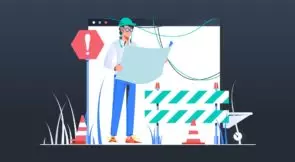In the era of advancing technology, our lives increasingly revolve around websites and mobile apps. People love to accomplish their tasks on the go. For that, they need an impeccable app and site interface along with easy navigation—not to mention good functionality and user experience!
To ensure users get that great experience, testers are responsible for running different test scripts. After that, they report bugs and the issues they want to eliminate.
So you can see why software testers are in high demand!
A career in software testing has high prospects for success. So you’ll want to stay tuned; this post is going to help you start and navigate a career in software testing.
Let’s dive into the details.
Why Become a Tester?
Just as a copyediting job is a great fit for a grammar fanatic, software testing is the perfect job for a tech geek, especially if you like finding defects.
If you have an eye for perfection and you have a foundation of sound technical knowledge, a career in software testing is the ideal path for you. You’re paid to point out technical errors!
A software tester’s job is challenging enough to be interesting. But it’s not so tedious or difficult to make you feel overwhelmed. For example, you will be verifying a fix performed by someone else. That requires skills and brains! But you won’t be responsible for elaborate debugging and maintaining the code.
Software testing is different from other jobs that seek specialization in a narrow set of skills. As a tester, you get to develop a wide range of skills. Plus, you can always beat the monotony due to the interesting nature of the job.
What a Software Tester’s Career Path Looks Like
Now that we understand what it’s like to be a software tester, let’s discuss the software tester’s career path. How you ascend to each level depends on your skill as well as how hard you work to achieve your goal.
Junior Test Engineer/Test Engineer
The name of the most junior position varies by company. This is the entry-level phase, when you’re just entering the software testing domain. So you won’t have any management-level responsibilities here.
Your test lead or QA manager will assign you tasks that you must complete within the assigned timeframe. These tasks might range from manual testing to writing automation scripts.
Meanwhile, management will expect you to undergo training in test automation frameworks or other technologies relevant to your organization or project. You can also take exams and get some certifications that will help you later in your career.
Senior Test Engineer/Test Lead
Now, in this position, your responsibility increases with experience. Management will expect you to write automation scripts or configure automation frameworks.
If you’re a test lead, you will also be responsible for handling a team and assigning tasks to team members. You must ensure that your team delivers all assigned tasks on time.
Management will expect you to suggest new technologies or frameworks, which will increase the company’s ROI. In this role, it will be beneficial if you have an advanced test analyst or an advanced technical test analyst certification.
QA Manager
Finally, after some years of working your way up in the industry, you are now at the topmost position in your testing career. From here, you can move up to the management level in the organization.
As a QA manager, your job is to ensure that the product meets the client’s acceptance criteria. But this is only the tip of the iceberg. You’ll need to motivate your team members, encourage them to learn new technologies (we’ll discuss some important trends later in this post), and oversee the team’s performance.
In some cases, you’ll have to convince the higher management why you need a certain tool or framework for your project and why it will be beneficial at the organization level. A certification will add authority to your advice. As a bonus, it will also make your resume stand out by showing how committed you are to the testing profession.
The demand for testers will never cease, so you don’t have to worry about compromised pay rates. If you have the necessary skills, you can reach the manager level, with the appropriate pay, in your software testing career.
How to Enter the Field of Software Testing
Now that you know what a tester’s career path might look like, knowing how to take the first step in this career path is a must.
Entering any field usually comes with a set of academic requirements. Additionally, a candidate needs a few skills to be successful. The same goes for software testing.
On that note, let’s check out the academic and skill requirements that you need to become a software tester.
Academic Criteria
Most software companies ask for a bachelor’s degree in computer science or IT. If you don’t have any prior testing experience, this degree can help kickstart your career in software testing.
But there are other factors besides a degree to consider. There are very few organizations who hire entry-level folks directly as testers. If you’re a fresh graduate about to enter the IT industry, familiarize yourself and strengthen your foundation in the technologies you studied at your university. Multinational companies usually hire newbies as trainees or junior software engineers and get them trained according to requirements.
In some companies, however, there won’t be any training. Management will directly assign you to a team and observe you to see which role suits your skills. It will help a lot if you can study on your own or get external software testing training. After that, you can participate in the ISTQB Foundation Level Examination and get the ISTQB CTFL certificate.
Skills Required for Software Testing
Academic qualifications are a plus for starting as a software tester, but they’re irrelevant if you don’t have the skills for the job. So let’s discuss the skills you need to be successful in this field.
Understanding Priorities
Software testers need to adhere to strict timelines. So you have to know how to prioritize different tasks. Let’s say you need to provide the output of a functionality or a module after testing. You should know which task you have to complete more urgently. A tester should also understand what to carry out at the last moment. Besides that, you have to understand what requires manual testing and where tools can help.
Analyzing Data and Test Environment
Apart from regular testing, a tester is also responsible for collecting data after running tests. After that, a tester needs to analyze the data for a particular product behavior.
Besides analyzing data, you should also be able to analyze the test environment and interruptions. This helps you reach the root of the problem or the origin of a bug.
Correlating Software Testing With Real-Time Scenarios
As a tester, you have to keep user experience in mind.
While testing, step into the customer’s shoes to understand what they need. You’ll have to relate testing to practical applications. And as a tester, you’ll need this skill more than any other! This approach also helps testers generate new ideas and makes your job more interesting.
Working as a Team
A tester is a part of a team comprising of developers and stakeholders. As a tester, you have to work in close coordination with the development team. Moreover, you need to be cooperative with your teammates. You have to accept that not all decisions are under your control. Thus, maintaining a team spirit and an amicable work environment are important skills of a good tester.
Being Curious and Facilitating Excellent Communication
In most companies, testers have to deal with incomplete or vague requirements. Moreover, you’ll want to grasp the working of the software to identify bugs. Asking the right questions at the right time is a must.
You’ll only ask questions if you’re curious enough to clarify queries. And to get the right answers, you need flawless communication skills!
If you’re curious enough to ask questions, then you’re also probably curious enough to read the material that will up your testing game. For that, check out a few posts on the basics, like the difference between automated testing and test automation, how to get started with UI testing, or the three qualities you should have to be an excellent tester.
Responsibilities of a Software Tester or a QA Engineer
Now that you have a basic understanding of what a tester does, it’s time to take a look at your responsibilities as a software tester, step by step.
- Analyze a requirement: The customer provides the requirement to the team. In the meeting between stakeholders, developers, product owners, and testers, everyone analyzes the requirement. It helps in prioritizing different tasks and work as a team.
- Estimate test efforts: When you’re done grasping the needs of a project, it’s time to estimate efforts. Testers need to identify how much time each task will take. It helps in maintaining efficiency throughout the testing cycle.
- Document test cases: Every firm has a different format for documenting test cases. Based on modules, a tester has to prepare different test cases or scenarios.
- Find and report bugs: You need to have a deep knowledge of the required tools to execute test scripts and run test cases. And you need to make sure that the customer doesn’t have any bugs to report in beta testing. Keep an eye out for unusual defects. Also, you need to be thorough with the templates your firm uses for reporting bugs.
Facts About Testing You Must Know
To be a successful tester, you have to be aware of some important facts about this field. Let’s take a look.
- If you like challenges, testing is a very enjoyable job! From prioritizing test procedures to keeping yourself up to date with new trends, innovative thinking can come in handy. So, if you’re an out-of-the-box thinker, a career in software testing is ideal.
- If you think that testing is merely about running test scripts, it’s time for me to burst that bubble. Since you have to acquaint yourself with new automation tools and different methods of manual testing from time to time, the opportunities to learn never cease.
- Testers are valuable to a firm—maybe more than they think. After all, you’re using every product before the customers do! Isn’t that a lifesaver for the end-user?
- Some in the software industry believe that a developer is superior to a tester. If a developer’s task is to create an application, testers have to think about how to break it. In short, both activities require equal creativity. Thus, the role of a tester is no less than that of a developer.
Testing Trends to Keep an Eye Out For
Knowing the basics of testing is important, but so is staying on top of software testing trends. The testing domain undergoes a lot of changes as the IT sector develops.
The lesson? If you want to stay ahead of the competition, keep an eye out for trends in testing. Here are some to keep in mind.
Testing of Security and Mobile Payment
With technology advancing, no one likes to carry loads of cash while shopping. The convenience provided by technology has increased the use of mobile wallets and other online payment systems. But the biggest problem with the emergence of online payment gateways is compromised security. Since it’s relatively new, testers need to find ways to eliminate security-related bugs to avoid mishandling of secure data.
Internet of Things
Testing is not just about software anymore. With devices going smart, homes and offices are implementing smart systems for carrying out various functionalities. For instance, a door might open automatically with footsteps approaching. Motion sensors make it possible. Similarly, there are many other devices and functionalities automated with advancing technology. Thus, being familiar with sensor testing, network interface, user interface, and hardware is an added advantage.
Cross-Browser Testing
Gone are the days when Internet Explorer ruled the internet. Now, with a plethora of browsers available for surfing, each site must give the same performance on all. Thus, cross-browser testing is becoming a must for most software companies. Testers need to keep an eye out for different browsers and automated tools that help in cross-browser testing.
Testing in Artificial Intelligence
In the future, systems (instead of humans) are going to be developing more systems. This is what artificial intelligence is capable of! However, the point of concern for testers is that, in AI, trends keep evolving. Thus, for testers, it’s vital to stay up to date.
Automation Is the Current Trend
The demand for automation testers has grown in recent years. Very soon, the requirement of only manual testing will completely vanish from the job portals. Testers should focus on learning test automation tools and frameworks. They should also familiarize themselves with how testing works in an agile environment.
Summing Up
With an increase in digitization, the demand for testers in IT firms has increased. Software testing determines the usability and quality of the end product. Thus, the demand for skilled testers is bound to rise in the future.
Get yourself trained in the latest automation tools and frameworks. Study and practice, and get ready to thrive in the journey of a software tester.
Author bio: This post was written by Arnab Roy Chowdhury. Arnab is a UI developer by profession and a blogging enthusiast. He has strong expertise in the latest UI/UX trends, project methodologies, testing, and scripting.




